I was talking to a PhD student recently about her confirmation seminar which she had given a few days earlier. Her presentation went fine but she’d had a lot of logistical problems that caused a bit of anxiety. And most of them related to booking the room. You’d imagine this would be fairly straightforward but I’m going to go through five things you need to know about booking rooms. I’ve learned all of these from the school of bitter experience.
1. Not all rooms are equal
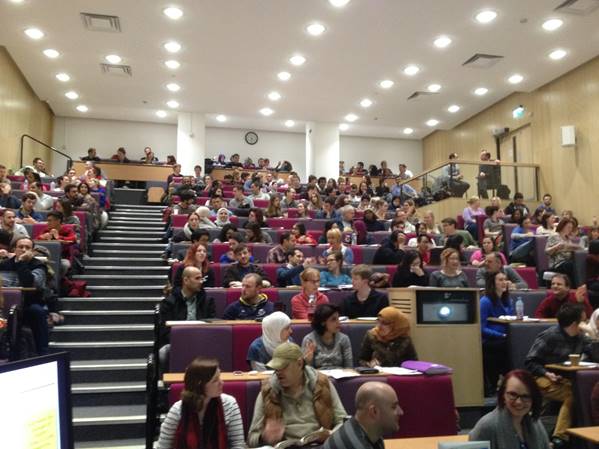 If you say to the keeper of rooms “I need a room” you may get a room but one that is not appropriate for your presentation. I’ve run workshops for ten people in a lecture theatre that seats 300 people. I’ve run workshops for 100 people in a room that holds eighty.
If you say to the keeper of rooms “I need a room” you may get a room but one that is not appropriate for your presentation. I’ve run workshops for ten people in a lecture theatre that seats 300 people. I’ve run workshops for 100 people in a room that holds eighty.
Some rooms will not have a/v equipment or a whiteboard. Or the room may be in some obscure corner which means nobody will be able to find it.
So, not all rooms are equal. Work out what you need and find a room that suits. If you have to go through the keeper of rooms then explain clearly what you need and check out the room they assign.
2. Book and re-book
If you wait until the week of your presentation you will probably find that all the good rooms have been booked months ago and all that’s left now is an extended broom cupboard. So to get the room you want get in early.
Once you’ve booked the room you might assume all is well. That is until the day of the presentation when you turn up at the room only to find another group firmly entrenched. This will be followed by an awkward conversation during which you realise the room has been double-booked or your booking has strangely been lost and nobody remembered to tell you.
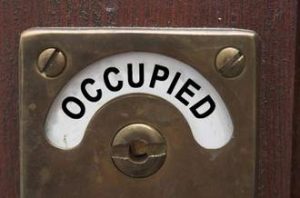 You might be justifiably annoyed about this but that doesn’t solve your immediate problem – the twenty people behind you waiting to get into the room and hear your presentation. And it also doesn’t help your anxiety levels which have now gone from high to extreme.
You might be justifiably annoyed about this but that doesn’t solve your immediate problem – the twenty people behind you waiting to get into the room and hear your presentation. And it also doesn’t help your anxiety levels which have now gone from high to extreme.
So double-check, and if it’s an important presentation, triple check your booking as you get closer to the presentation day.
3. Setting up time
Let’s assume your presentation is running from 10:00-11:00am. Because you’re organised you turn up early, say 10:30am to get set up.
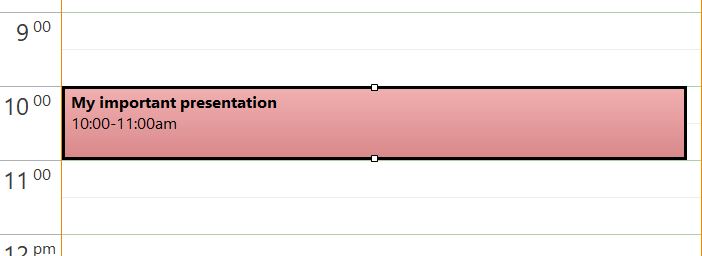 However as you are about to open the door you realise that there is another meeting in the room which runs from 9:00-10:00am. So you can’t get in to set up. And at 10:00am they show no sign of finishing so now you have to barge in with grumpy people in front of you and a line of grumpy people behind you. And you have no time to check your equipment, to set up the chairs, to give out the handouts.
However as you are about to open the door you realise that there is another meeting in the room which runs from 9:00-10:00am. So you can’t get in to set up. And at 10:00am they show no sign of finishing so now you have to barge in with grumpy people in front of you and a line of grumpy people behind you. And you have no time to check your equipment, to set up the chairs, to give out the handouts.
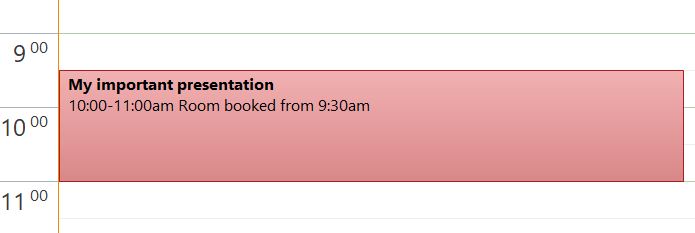 So book the room for at least a half-an-hour earlier than when you begin. Longer if you are using complicated technology and have to move the furniture around.
So book the room for at least a half-an-hour earlier than when you begin. Longer if you are using complicated technology and have to move the furniture around.
4. Wrapping up time
So you’ve done that – you book the room from 9:30 – 11:00am. But as you get near the end of your presentation, say 10:50am you notice people gathering outside the door or even the odd one barging right in. Because of course they’re waiting for the 11:00am meeting. So now you have to rush your conclusion and there will be people wanting to ask you questions. And as you try to dismantle your computer the next presenter is hovering over your shoulder trying to get ready. (And inevitably because you’re rushing you will forget your memory stick. Been there, done that.)
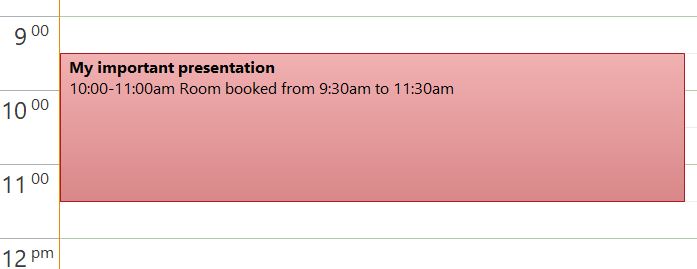 So book the room for at least half-an-hour after your presentation is due to end.
So book the room for at least half-an-hour after your presentation is due to end.
5. Book technical support
Recently I was giving a workshop in an Australian university which was going to be tele-conferenced to a group in Malaysia. The workshop was due to start at 2:00pm and I was assured technical support had been arranged. At 1:30pm no sign of any technical support. At 1:45pm no sign, which led to some hurried calls. Because of course the technical support had been booked for 2:00pm. Which would have meant that the first ten minutes of the session would have been “Can you see us in Malaysia? Can you hear us now?” and so on.
So book the technical support for 30 minutes before the start of your presentation.
Summary
You might think this seems like overkill. Surely you can just rely on the keeper of the rooms or the technical person to do their job.
However, it’s your presentation. You will be the person standing up in front of the audience explaining why things have gone wrong. And your anxiety will be rising all the time. You can blame the other people all you like but your presentation and reputation will suffer.
So if you have to give an important presentation and you want it to go well, check and double check.

